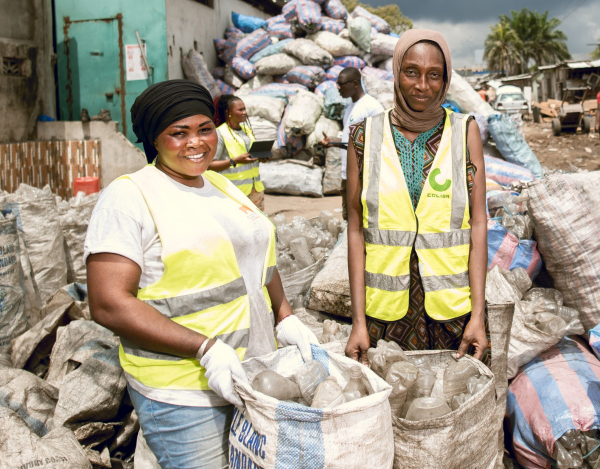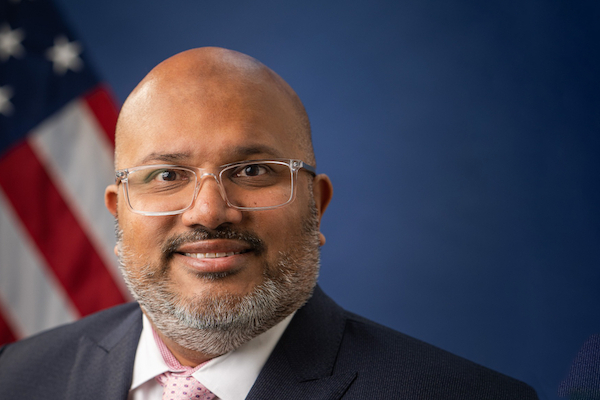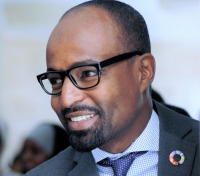Waste management is a challenge in several large African cities. As municipal services and even NGOs seem to be overwhelmed by the issue, startups are stepping in to develop innovative solutions.
Coliba is a digital platform developed by Ivorian waste management startup Coliba Africa. It allows the collection and recycling of plastic waste in Ivorian cities, notably in Abidjan where the startup has some fifteen waste containers.
Coliba Africa was founded in 2017, by Yaya Koné and Genesis Ehimegbe. According to Yaya Koné, it aimed to let households know how valuable their waste is. Indeed, for every waste deposited in Coliba’s containers, households receive points and bonuses that can be exchanged for vouchers or basic food or school kits depending on the neighborhood.
“We believe that plastic bottles must be considered as raw materials and informal waste management operators should be formalized thanks to the training we offer,” co-founder Yaya explains. He adds that Coliba’s services are accessible to every social class since they can be contacted via the internet or phone calls.
To reach a wider audience, the startup developed a mobile app (available for Android and iOS devices) but, it also has telephone numbers where users can reach out via calls or just by sending SMS. By using the mobile app, households can identify the nearest collection points, ask Coliba to come to pick up waste, convert their bonuses and points to rewards and remain informed about the latest waste recycling news on the African continent.
The startup has installed waste containers at filling stations, schools, and supermarkets. In Abidjan, it claims 135 containers, 16 operational stands where informal waste managers can sell their plastic waste and 64 direct jobs created.
It plans to cover the whole of Abidjan and enter other African cities by 2023. In 2020, it received an undisclosed amount of financial support from GreenTec Capital Partners to support its growth. The plastic waste it collects is used for the production of PET flakes for manufacturers. It produces over 1800 tons of PET flakes every year with hopes to reach 15,000 tons yearly by 2025.
Adoni Conrad Quenum
Over the past four years, Africa's startup industry has attracted significant investors. The number of innovations developed is growing with beneficial impacts on the lives of millions of people. Several tech solutions developed by African startups have gained international recognition.
African startups have developed a fantastic ecosystem, according to Arun Venkataraman, the U.S. Assistant Secretary of Commerce for Global Markets. Speaking during an exclusive interview, with Ecofin Agency, before the next US-Africa Leaders Summit, the official revealed his country’s admiration of the digital ecosystems developed by African countries.
“The fantastic ecosystems developed by startups in countries like Nigeria and Kenya as well as the innovations that have come out of them” meet the expectations of the creative and forward-looking African youth, who are the core of the demographic dividend, he said.
"If this dynamic is carefully backed by the right policies, it can lead to great success and greater innovation that will benefit every one of us," he emphasized
Arun Venkataraman estimates that digital technology is one of the sectors where Africa and Africans can contribute a lot to their trade relationship with the U.S. "The U.S is looking forward to the innovations and new ideas contributed by Africans. We see Africa not only as a consumption market for U.S. goods and services but also as a key provider of the goods and services the United States needs,” he told Ecofin Agency.
Over the past four years, Africa's start-up industry has indeed undergone a profound transformation. The number of innovative companies created on the continent has increased. The volume of investments they attracted has gone up as well, following a sharp uptrend. According to Partech, African startups attracted US$1.16 billion in 2018. By 2021, that volume rose to US$5.2 billion. Investors committing funds to those innovative companies include American companies such as Bezos Expeditions, Visa, PayPal, Sequoia Capital, and LeapFrog.
For Arun Venkataraman, given the dynamism of its startup ecosystem, “Africa is much more than a commodity market. Even though we have to help it develop strong value-added sectors, we admire the successful ventures noticed because they add value to the U.S., but also the global market as a whole.”
Muriel Edjo
In 2020, the coronavirus pandemic forced most African countries to accelerate their digital transformation. In that regard, they focused heavily on boosting access to the internet and digitization of public services. Meanwhile, with the development of new technologies, cybersecurity has become an ever-present issue. Hence, the Nigerien government wants to devise a strategy to protect residents against cyber threats.
Niger validated Wednesday (July 20), the first draft of its national cybersecurity strategy. The draft was validated during a workshop held at the Niamey Congress Palace.
According to Minister of Posts and Telecommunications Hassane Baraze Moussa, the national strategy will safeguard Niger’s digital transformation. Cybersecurity “ is not a privilege. It is a requirement because of cyberspace issues. […] Elaborating a national cybersecurity strategy is a key step to guarantee Niger’s digital transformation,” he explained.
“Cybersecurity is essential in almost every human activity. It has become a priority for companies, but also for governments, which must protect people and properties,” the official added.
Niger initiated the elaboration of its cybersecurity strategy in June 2018. Almost four years later, the completed and vetted strategy is in line with the country’s 2022-2026 socioeconomic development program, the ECOWAS regional cybersecurity and cybercrime strategy, and the African Union Convention on Cyber Security and Personal Data Protection. It is part of Niger’s national security strategy.
Samira Njoya
Over the past five years, there has been a steep rise in the volume of investments secured by African startups. All through those years, Nigeria has almost always been the country attracting the most startup investment. Authorities now want to enhance those startups’ capabilities with a dedicated legal framework.
The Nigerian Senate passed Wednesday (July 20), a startup bill first drafted in June 2021. With its bill passing the Senate review, the national startup ecosystem is getting closer to its goal of ensuring “that Nigeria's laws and regulations are clear, planned, and work for the tech ecosystem.” The two steps remaining are validation by the House of Representatives and the signature of the President of the Republic.
The main objectives of the bill are "to provide a legal and institutional framework for the development of startups in Nigeria and to provide an enabling environment for the establishment, development, and operation of startups in Nigeria; Foster the development and growth of technology-related talent and position Nigeria's startup ecosystem as the leading digital technology hub in Africa, having excellent innovators with cutting edge skills and exportable capacity.”
Currently, Nigerian start-ups attract the most investment in Africa. They are thriving thanks to a long battle fought by the private sector. Nowadays, analysts point to their contribution to economic growth in the current digital age, and public authorities are determined to provide a better framework for their development.
In its nascent start-up bill, Nigeria has provided several facilities that will help accelerate the maturation of startups. The facilities include a label entitling to tax incentives, financial facilities through a dedicated seed fund, and customs facilities as well as training.
Once the bill is passed, Nigeria will join the list of the few African states that have adopted specific startup regulations. These include Senegal, Tunisia, and Mali.
Muriel Edjo
The smart card will serve as an ID card, allowing access to various government services. It will be used as a payment card to settle transactions.
Lagos, Nigeria’s economic capital, will start issuing smart ID cards to its residents. For that purpose, the state signed Wednesday (July 20), a partnership agreement with fintech company Verve International. The smart card is an enhanced version of the identity cards issued by the Lagos State Residents Registration Agency (LASRRA).
“We have upgraded the residency card from an ordinary plastic card, for identification purposes only, to a smart, multi-purpose card that combines biometric identification with other functionalities and benefits, that cuts across areas such as security, financial services, mobility, and access to government services and amenities,” explained Lagos State Governor Babajide Sanwo-Olu.
According to the governor, the smart ID card is “borne out of the need to embrace change and align with global best practices.”
Dubbed "LAG ID", the smart card is a first of its kind in the country. It will enable holders to conduct transactions anywhere and anytime, easily verify their identities and access various social amenities provided by the government. It will “ultimately help inform the government’s planning and provision of services designed to secure lives and property,” Governor Babajide adds.
The card comes with an electronic wallet that can hold funds and be used for daily transactions and support monetary authorities' cashless program.
The partnership between Verve International and Lagos State Government is in line with the fintech company’s ambition to create a digital identification system in Nigeria. Recently, the company partnered with the National Identity Management Commission (NIMC) to develop a digitization framework for the efficient management of Nigerians’ identity.
Samira Njoyav
After eight years of professional experience in the tech sector, he made the big jump into the entrepreneurship world. His choice seems to have been the best given his successful ventures.
Jean-Louis Mbaka (photo) is a Congolese IT engineer. In 2017, he co-founded Kinshasa Digital, a digital marketing and web development agency offering digital solutions to boost companies’ activities.
Kinshasa Digital is not the only digital venture created by the tech entrepreneur. For instance, the same year when he co-founded his digital marketing agency, he also launched Youdee, a real estate listing website. Two years later, he launched Kinshasa Digital Academy, which offers digital training.
With Kinshasa Digital Academy, he wants to pass on digital skills (web and mobile development in particular) to as many people as possible to boost professional integration. The training program spans over 12 months, including nine months at the academy and three months of internships.
The initiative attracted some well-known companies like Vodacom. In April 2022, the telecom company signed a partnership with Kinshasa Digital Academy to build a research and innovation lab, dubbed Vodacom Digital Lab, in DR Congo.
“In line with our aim, which is to develop local and robust content and applications, “Vodacom Digital Lab” will provide a platform to allow Kinshasa Digital Academy’s learners and developers around the city of Kinshasa to have a better understanding of some sectors as well as enable them to develop and test their solutions,” Jean-Louis Mbaka said when signing the deal with Vodacom. On July 8, 2022, the two partners presented a digital platform to follow-up and monitor Covid-19 patients. The platform was the result of the partnership between Vodacom and Kinshasa Digital Academy.
With his decade-long professional experience in the digital sector, Jean-Louis Mbaka believes that digital technologies can solve many problems. He started his professional career, in 2009, as technical support for the engineering firm Entreprise Générale Malta Forrest (EGMF). After a brief stint with tech company Schlumberger, he was recruited by logistics firm EGAL SA in 2014. He embarked on his entrepreneurship journey in 2017 while still working for EGAL SA.
Melchior Koba
There is a huge gap between the academic and professional world. To equip young people with the practical experience needed to bridge that gap, a Rwandan startup developed a virtual internship platform connecting students and companies.
BAG Innovation is a digital platform developed by a Rwanda startup founded in 2017. It allows students to get practical experience via virtual internships in large firms.
“BAG seeks to disrupt the traditional approach to how individuals acquire experience at school and build up the next generation of problem solvers. This is why our name is "BAG - Building A Generation," the startup indicates.
To access its services, students have to create an account by providing their personal information. Then, they detail their academic career and areas of interest. Those steps help BAG Innovation present the internships most suited for every profile.
Thanks to augmented reality and machine learning, BAG tests students’ skills by confronting them with real-life situations in one of its partner companies. It also uses a mix of artificial intelligence and gamification to enable students to “complement theoretical learning with practical experience.”
The start-up claims to have reached more than 8,000 students in Rwanda, including 600 who received job offers. It has partnered with about 15 universities and more than 115 small and medium-sized enterprises.
Adoni Conrad Quenum
The systems engineer considers the digital sector a goldmine of opportunities for the Chadian youth. Instead of using words to convince the youth of that reality, he chose to take action and led the way. To succeed in his bid, he even took courses to ensure he can offer effective support.
Hamid Khayar Defallah (photo) is the founder and CEO of incubator Chad Innovation. The software engineer created Chad Innovation in 2018 to help young people improve their living conditions. The incubator organizes training sessions, debates, and forums to let participants present their ideas, pick up project ideas and get support for the implementation of their various projects.
Although Chad Innovation was created in 2018, it started breeding in its founder’s mind in 2014 when he made an appalling realization as a teacher at the University of N’Djamena. Indeed, it dawned on him that after graduation, it was difficult for most students to get jobs. So, he started reflecting on how such laborforce can be absorbed. “That is how I got the idea to create an innovation space where ideas can be discussed to detect the most innovative,” Hamid explains.
He started maturing the idea in 2016 after he completed an entrepreneurship training program at the University of Texas. Two years later, the incubator was officially launched. However, it is not the first venture launched by Hamid. In 2013, the latter co-founded the IT service firm Africatech World of Technology, after years of polishing his skills in the digital sector considered a goldmine of opportunities for the youth.
After an internship at the Agency for Aerial Navigation Safety in Africa and Madagascar (ASECNA), he joined the now-defunct public broadcasting corporation ONRTV in 2012 as a technical support engineer.
He left ONRTV in 2015 and joined the Chadian research and development center CNRD as a research assistant and IT manager. While still officiating at the CNRD, he completed a two-month internship at the Global Entrepreneurship Network, learning how to build a startup ecosystem. When he left the CNRD in 2017, he was recruited as an IT manager for Radisson Blu Hotel N'Djamena.
Since December 2020, the tech entrepreneur is the director general of the Chadian digital transition agency.
Melchior Koba
The number of solutions connecting artisans and individuals is growing in Africa. With those solutions, entrepreneurs are trying to facilitate their compatriots’ living conditions by using tech solutions.
Iya is a Togolese digital platform that networks artisans with individuals who need blue-collar workers. It also includes a specialized e-store. The digital solution was launched in 2021 but, it was being developed since 2020.
“Iya.com is a company that provides artisans for all kinds of repair or renovation works. It aims to offer individuals, companies, and craftsmen the easiest way to identify and carry out all kinds of work,” the startup behind it explains.
The platform has a mobile app, available for Android devices only. Users who want to hire artisans can open a “client account” and select among the artisans available. As for blue-collar workers, they can create a free “worker” account and apply for the offers available in the nearest neighborhood.
Iya lists more than two hundred artisans working in several sectors. It also has an online store where fashion accessories, furniture, paintings, and sculptures are sold. The objective is to promote the artisans present on the platform.
Adoni Conrad Quenum
The Covid-19 pandemic accelerated digital transformation in most African countries. Nowadays, investments that were previously concentrated in urban areas are increasingly channeled to the development of rural areas, which house most of the population.
Nigerien Minister of Posts and Telecommunications, Hassane Baraze Moussa, presided over the launch of the first edition of the Smart Village Innovation Forum (FIVI) last Monday. The forum, which will be concluded tomorrow (July 22), serves as a framework for reflection on rural areas’ digital transformation. Its theme is “Tec4Dev through Carpooling for Development.”
According to Minister Hassane Baraze, the end goal of the reflections will be to help materialize the government’s commitment “to connecting the rural areas by supporting state institutions and agencies.” It will also help “achieve the state agencies and institutions’ strategies, and end the digital isolation of Niger’s administrative villages.” The reflection is also expected to help “promote the use of e-services in urban and rural areas to notably improve financial inclusion, as well as create an ecosystem that is conducive to the development of local digital content and facilitates support to local startups.”
The plan currently set in motion for the digital transformation of rural areas in Niger is in line with the government’s commitments in its Renaissance Program Act III. The program notably provides for the modernization of rural areas by developing production and human capital as well as improving financial inclusion. By leveraging information and communication technologies, the country can quickly reach those goals.
In 2021, the country’s internet penetration rate was around 30% with low public services digitization scores. According to UN data, in 2020, it was among the countries with the lowest e-governance index, ranking 188th out of 193 countries. Developing broadband connectivity that supports digital services and information is one of the key requirements for the government of Niger to realize its "smart villages" ambition.
Niger "has a predominantly young population living in rural areas. [..] Our youth are our main asset. By training them and allowing them access to information, we will create better conditions to achieve our development objectives,” said Hassane Baraze Moussa.
Adoni Conrad Quenum
More...
A few years ago, Ghanaian authorities initiated digital transformation projects to boost the adoption of digital technologies and promote innovation in key productive sectors.
Ghana inaugurated, Monday (July 18), its national e-pharmacy platform. The platform, dubbed “National Electronic Pharmacy Platform,” is the convergence of licensed local pharmacies. It “will enable Ghanaians to have access to prescribed medicines and buy them by making an order with a mobile phone through the ePharmacy app, website, or a shortcode, and have the medicine delivered to a requested location,” the government indicates.
“'The introduction of the National ePharmacy Platform (NEPP) is meant to safely and securely make available medicines, reduce the burden of cost and save time,” explained Ghana’s Vice President, Dr. Mahamudu Bawumia.
According to Ghana's Ministry of Communication, although cell phone penetration is over 100% in the country, people have yet to fully embrace ICT in their daily lives or business operations. Less than 10% of the population uses the internet and mobile broadband use is extremely low, the ministry informs.
NEPP is part of the e-Transform strategy launched by the Ghanaian government a few years ago. The strategy aims to boost broadband access and improve the efficiency and quality of certain digital public services. It also eyes an enhancement of Ghana's digital innovation ecosystem to help create better jobs and a better economy. In addition, it will improve the allocation of government resources, leading to the efficient use of public funds. Above all, the strategy is expected to promote entrepreneurship and create more jobs.
Let’s note that according to the World Bank, with an average of 19% growth rate annually between 2014 and 2020, the digital sector is one of Ghana’s best-performing sectors.
Jean-Marc Gogbeu
Healthtech solutions are sprouting to help the African population easily access healthcare. In Cameroon, an entrepreneur is focusing on preventive care.
Healthlane is a digital platform developed by a Cameroonian startup founded in 2020. It allows users access to quality and affordable healthcare in Cameroon and Nigeria.
The platform has a mobile app (available for Android and iOS devices), through which users can book preventive care. To keep users healthy, it allows dozens of preventive checks.
Healthlane has a range of premium health packs allowing access to its services. Its packs cost between XAF50,000 and XAF250,000. For instance, the XAF50,000 pack gives access to 48 preventive checkups against over 100 preventive checks for the XAF250,000 pack. The startup aims to help users “detect diseases before they strike.” So, even people with health insurance plans can buy Healthlane’s packs.
The startup claims over 500 preventive checkups performed, over 10,000 curative care given and 10,000 vaccines administered. In 2020, it participated in the winter cohort of Californian accelerator Y Combinator. The same year, it raised US$2.4 million to boost its development. It even announced its expansion to the Kenyan and Ivorian markets in the next few months.
Adoni Conrad Quenum
Over the past few years, he has taken numerous initiatives to empower the youth and promote digital entrepreneurship in his country, Djibouti. Thanks to his commitment to the task, he has won the trust of international and national actors.
Mohamed Guireh Galab (photo) is a Djiboutian entrepreneur. In 2018, he founded StartUp Factory, an incubator that trains entrepreneurs and invests in innovative projects, from product ideas to launch. His incubator is accessible to digital enthusiasts who want to make money from their passion, ICT, in Djibouti.
Over the years, StartUp Factory, currently present in six cities, has developed partnerships with public institutions, including microfinance institution CPEC and the private investments’ promotion agency FDED. The partnerships aim to give Djiboutians an opportunity to implement their project ideas.
Galab is very committed to youth empowerment. To drive that goal further, four years ago, he co-founded Djibouti’s young entrepreneurs’ network CJED. With CJED, he facilitates experience-sharing, networking, and value-chain-creation. “CJED offers equal opportunity for every young Djiboutian to create, develop or revive his/her company,” Galab says.
Since 2012, he is the national chairman of Junior Chamber International (JCI) Djibouti. In 2019, he became a country director for the Global Entrepreneurship Network, launched in 2008 to build a global entrepreneurship ecosystem. The following year, he was named Djibouti's ambassador to Africalink, a network of entrepreneurs operating in Africa and Europe. The entrepreneur is also a Young African Leaders Initiative (YALI) alumni, who took part in the 2017 training program at Clark University, Atlanta. In 2021, he made it to Africa Digital Festival’s top 50 continental digital champions 2021.
Melchior Koba
Last year, Côte d’Ivoire’s mobile money market was shaken by a new actor, which increased competition with an aggressive pricing policy. The competition forced strategic adjustments, much to users’ benefit.
In Côte d’Ivoire, Orange Money Afrique is no longer reserved for Orange Côte d’Ivoire’s users only. Indeed, to boost financial inclusion in the country the telecom operator opened access to its platform, allowing users to carry out various financial transactions irrespective of the network they are subscribed to.
According to Mariame Diaby Touré, CEO of Orange Money Côte d’Ivoire, to carry out their transactions, users only have to download the Orange Money Afrique app, register by following the required steps, and validate their mobile money account. Then, they can send or withdraw money, carry out merchant services and pay bills right from the app.
By opening Orange Money Afrique to other networks’ subscribers, Orange Côte d’Ivoire materializes the mobile money interoperability being advocated by the government since 2020. “It is an additional step towards financial inclusion,” says Mariame Diaby Touré.
Currently, the telecom operator is multiplying initiatives to remain the leader of the Ivorian mobile money market disputed with Wave, MTN Money, and MOOV Money. To get closer to its users, the operator has 41,000 kiosks installed all over the country. It also made significant investments in its network infrastructure to guarantee quality services. Thanks to those investments, Orange Money Afrique is accessible everywhere, even in remote areas.
“We are proud to be part of Orange Group, which has great network ambitions. We have covered almost every part of the country with 3G and 4G,” Mariame Diaby Touré indicates.















